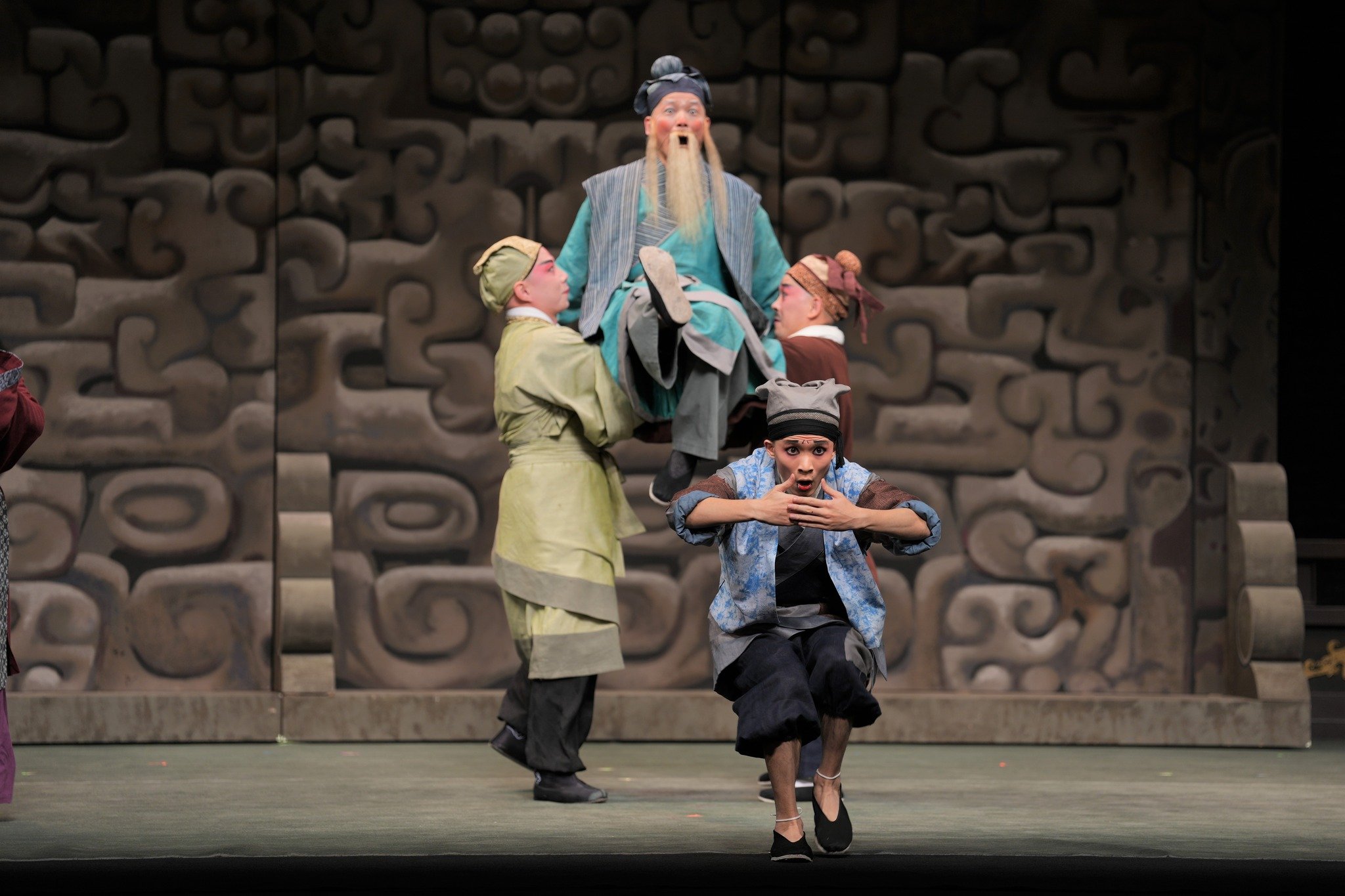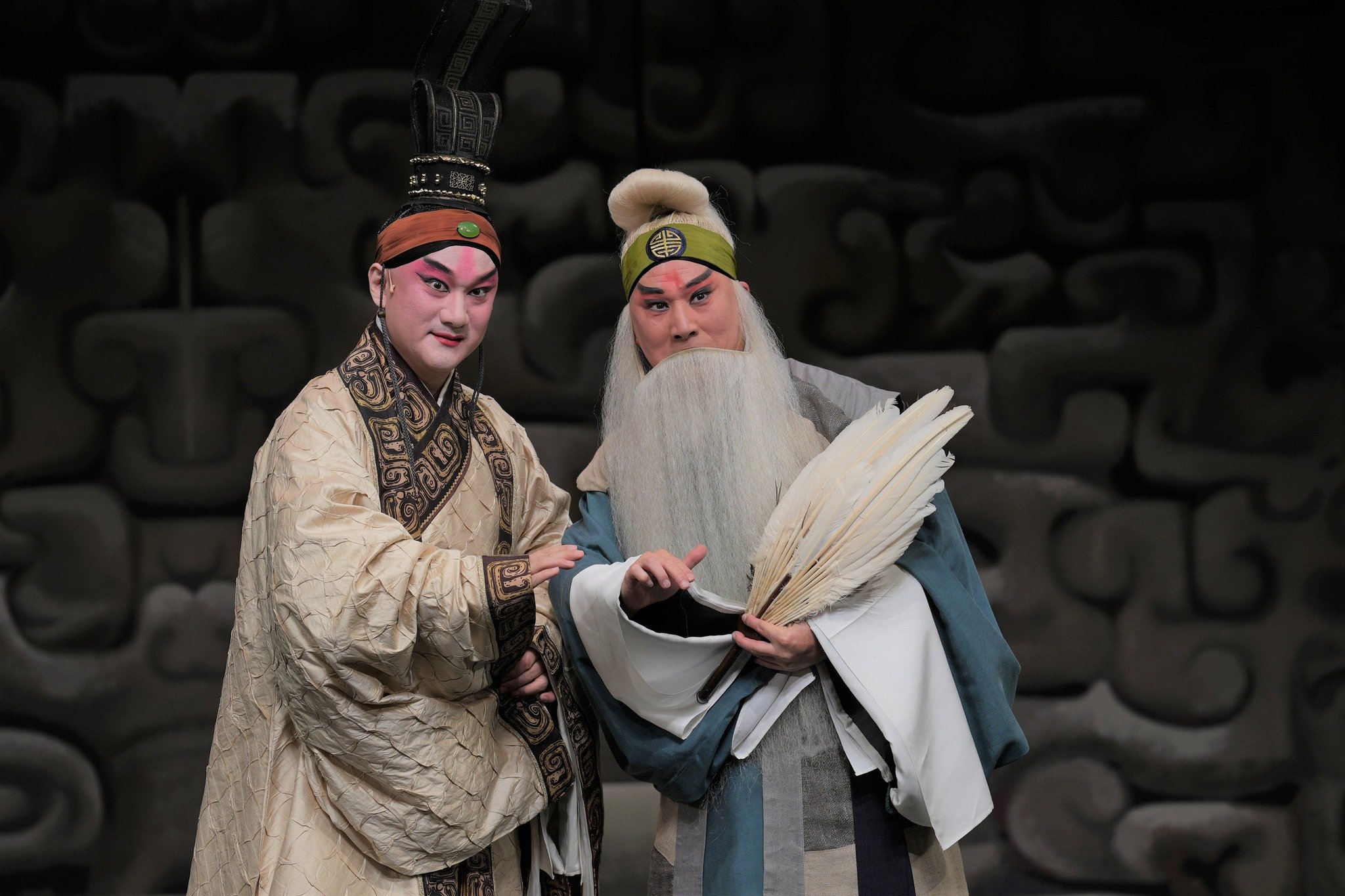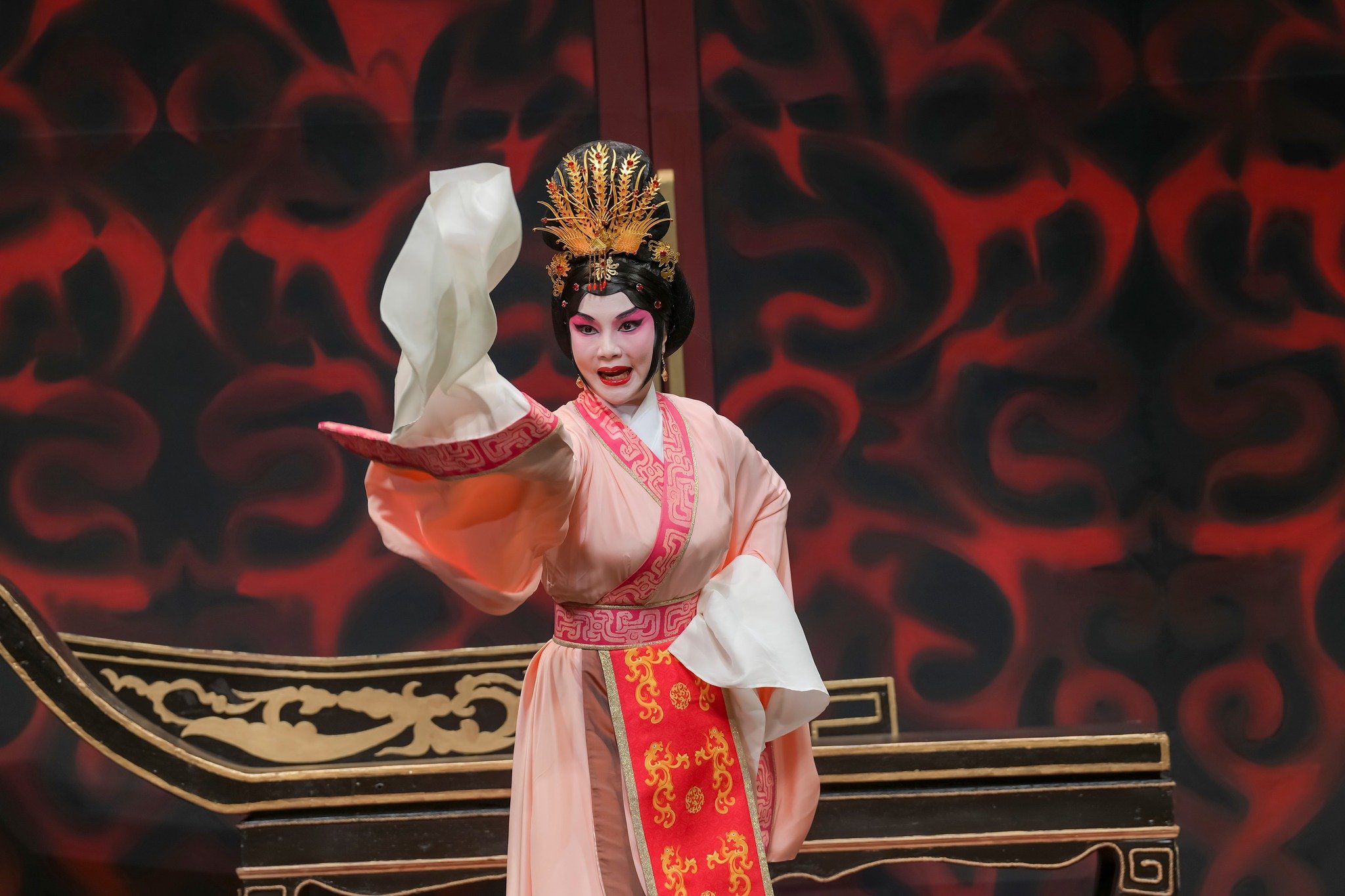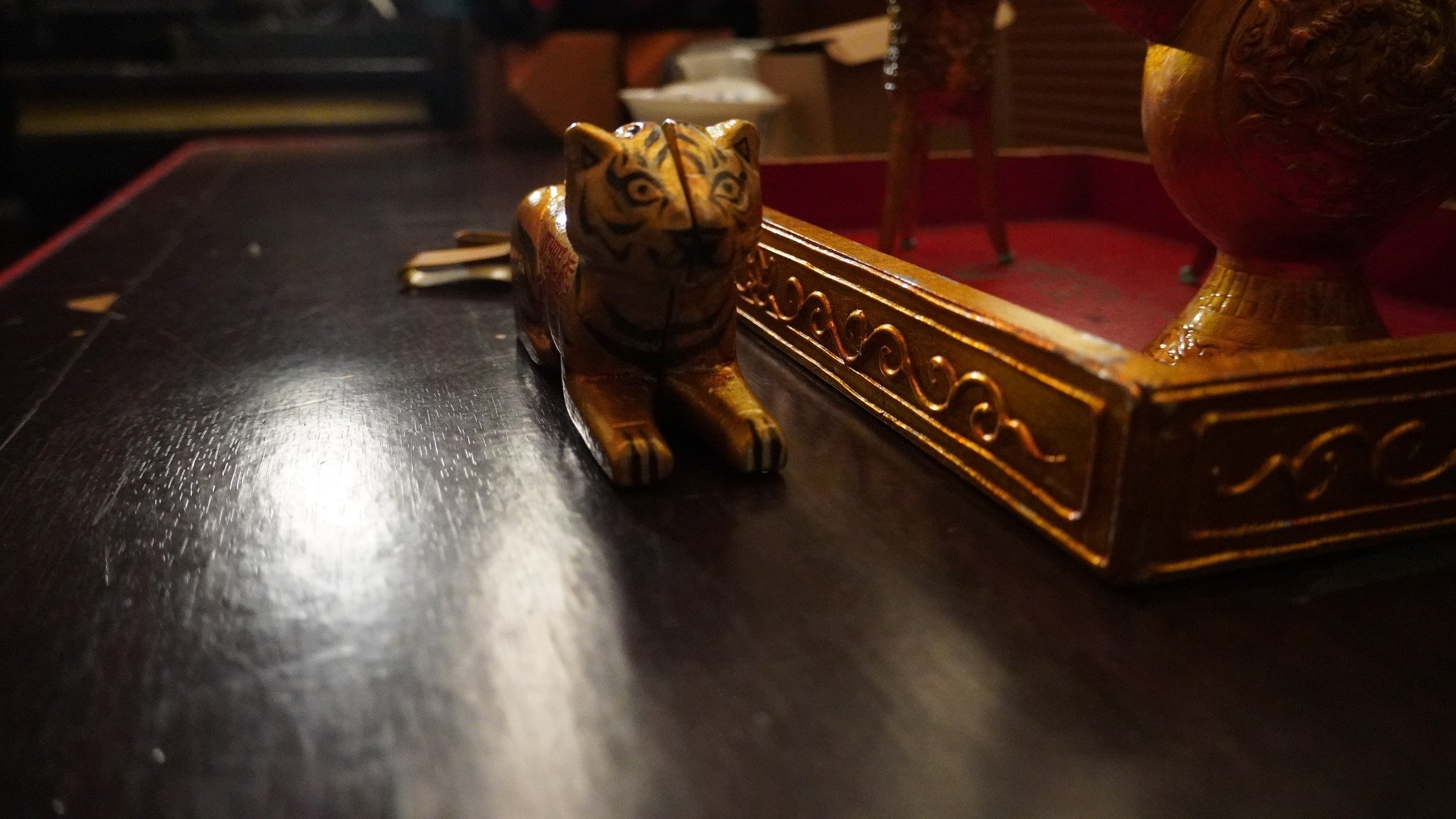The Tiger Tally and the Rescue of Zhao
In GuoGuang Opera Company’s most recent production, playwright Yong-Yih Tseng communicates his lifelong conviction that "the bonds of loyalty and friendship are beyond measure" — an ideal that is rare, and even archaic, in today’s world.
Performance: The Tiger Tally and the Rescue of Zhao
Genre: Chinese Opera
Worth the journey: ★★★★☆
In the first scene of The Tiger Tally and the Rescue of Zhao, King Anli of Wei (right) sees his half-brother, Lord Xinling (left), as a threat to the throne. Lord Xinling, on the other hand, is portrayed as a loyal subject to the State of Wei. Image courtesy of GuoGuang Opera Company.
TAIPEI, Taiwan — Last weekend at the Zhongshan Hall, GuoGuang Opera Company premiered their most recent production, The Tiger Tally and the Rescue of Zhao (虎符風雲), in tribute to its playwright, Yong-Yih Tseng (曾永義), who passed away last October.
Yong-Yih Tseng is a highly regarded scholar of Chinese Literature and, in particular, xiqu, the traditional performing arts. Through his extensive research, he explored the historical and cultural significance of xiqu over time, contributing greatly to our understanding of this unique form of Chinese cultural expression.
In addition to publishing numerous scholarly books, he is also recognised for his creative endeavour. With over 20 years of experience in playwriting for Chinese opera, Tseng has enriched the performing arts landscape in Taiwan.
As a distinguished scholar and creative, Tseng was elected as the Academia Sinica Academician in 2014, and bestowed with the Order of Brilliant Star (Second Rank) by the President of Republic of China in 2016.
The Tiger Tally and the Rescue of Zhao was written for the pillar of GuoGuang Opera Comany, Wen-Hua Tang (唐文華), and Wen Yu-Hang (溫宇航); the former is a laosheng actor in jingju (Peking opera), whereas the latter is a xiaosheng actor who, in Tseng’s view, is an iconic figure in kunqu (Kun opera) in Taiwan.
For those who are not well versed in Chinese history, The Tiger Tally and the Rescue of Zhao is an adaptation of a series of historical events that occurred during China’s Warring States period (475 – 221 BC).
In Shiji, or Records of the Grand Historian, Sima Qian (c. 145 — 86 BC) recounts the daring exploits of Lord Xinling, who stole the royal seal of State of Wei in order to assist its neighbouring State of Zhao during time of war.
The play begins by identifying an uneasy relationship between King Anli of Wei (reigned 276 — 243 BC) and his half-brother, Lord Xinling (born Wei Wuji), who was not only one of the Four Lords of the Warring States, but also served as a Senior General. This tension between the brothers culminates during a chess game between the brothers, revealing that King Anli sees his half-brother — a beloved, generous and influential aristocrat who has three thousand retainers in his service — as a threat to his reign.
Scene 2 begins with a comedy relief, in which citizens gather on the streets to gossip about Lord Xinling’s visit to Hou Ying, who will eventually become his trusted advisor. Image courtesy of GuoGuang Opera Company.
Lord Xinling (left) travels all the way to the Gate of Yi to take Hou Ying (right), a 70-year-old man, under his wings. Image courtesy of GuoGuang Opera Company.
In scene 5, Lady Ru was asked by Lord Xinling to steal the king’s tiger tally. In the original story, Tseng made Lady Ru a former lover of Lord Xinling. But taking into consideration of the story’s focus on qíng yì (bonds of loyalty and friendship), the troupe’s Artistic Director, Wang An-Chi, makes no mention of their past romance in the play. Image courtesy of GuoGuang Opera Company.
The State of Qin had launched an attack on Handan, the capital of State of Zhao. The Princess of Wei, who married the Lord of Pinyuan of Zhao, failed to seek help from his brother, King Anli. Finally, she turns to Lord Xinling, her younger brother, for assistance.
With the guidance of his 70-year-old retainer, Hou Ying, Lord Xinling hatched a plan to save the State of Zhao: Hou believed that the only way to make the rescue is to first obtain the king’s tiger tally.
In ancient China, tiger tally (hŭfú) was used as an imperial authorisation to verify troop deployment orders. A tiger tally usually consisted of two parts and, when combined, the two pieces form the shape of a tiger.
In the play, King Anli and his military commander, Jin Bi, who is stationed at the state’s border, each hold a part of the tiger tally. If Lord Xinling wants to convince Jin Bi, he would need the other half of the tiger tally in his possession.
Based on Hou’s advice, Lord Xinling persuades Lady Ru, one of the king’s concubines, to steal the tiger tally hanging from the king’s waist. He then ordered the strong man Zhu Hai to kill Jin Bi, who questioned the legitimacy of his tiger tally and had refused to deploy the troops. Without Jin Bin in his way, Lord Xinling ordered the troops to rescue State of Zhao from their enemy.
One would’ve thought that this is where the story would end. But, to my surprise, the three people who have contributed to Lord Xinling’s mission — namely Zhu Hai, Lady Ru, and Hou Yin — killed themselves one after another.
Left in despair, the play comes to an end with Lord Xinling’s soliloquy:
Dragon and tiger battle,
Paid with smoke and dust of time.But what endures with time,
Are friendships of priceless worth.Only to a friend we confide life and death,
No other can know the depths of emotions.Yet when success comes, and rifts appear,
The heart grows heavy with regret and fear.*
These few sentences sum up the whole play that lasted for more than two hours’ time. From this soliloquy, it’s clear that Tseng wants to draw our attention to “qíng yì wú jià” (情義無價), a proverb that conveys the idea that the bonds of loyalty and friendship are invaluable and cannot be measured by money — nor by material possessions.
“Qíng yì” is based on mutual trust, respect, and shard sense of responsibility. An emotion as intangible as it might seem, qíng yì was what drove Zhu Hai, Lady Ru, and Hou Yin to support Lord Xinling through thick and thin.
By amplifying these special bonds, Tseng not only adds depth to this moment in history, but prompts us to reflect on our bonds with our loved ones by asking the question: “To what extent are we willing to sacrifice ourselves for the people we love?”
Besides the bonds of friendship, Tseng also urges its audience to decide whether the actions taken — from stealing the tiger tally to killing the military commander who remained loyal to the king until his death — were just or unjust.
Perhaps it was not right to steal the tiger tally and kill the military commander, but if not, Lord Xinling wouldn’t have been able to save their his sister, as well as the allied State of Zhao from the hands of their rival.
Ultimately, as one would have guessed, there is no clear consensus on what is considered right or wrong, and different individuals may have differing perspectives based on one’s moral and ethical standards, as well as the particular set of religious and cultural beliefs with which one is raised.
Lost in contemplation, I came to the conclusion that, as long as Lord Xinling believed — even for a split second — that it was the right thing to do, then that’s all that matters.
However, one must bear in mind that, every action has a consequence, good or bad. In the case of Lord Xinling, though he fulfilled his mission, this success also comes with a painful consequence: his friends and comrades had no choice but to pay for the crimes they have committed.
A close look at the tiger tally used in GuoGuang Opera Company’s latest production, The Tiger Tally and the Rescue of Zhao. Image courtesy of GuoGuang Opera Company.
A tiger tally usually consists of two parts. Image courtesy of GuoGuang Opera Company.
Zhu Hai is seen holding mallets in a battle scene. Image courtesy of GuoGuang Opera Company.
The Tiger Tally and the Rescue of Zhao is one of the troupe’s hybrid opera repertoires that blends in jingju and kunqu traditions. According to An-Chi Wang, Artistic Director of Guoguang Opera Company, she arranged kunqu movement for characters to express their inner feelings, whereas jingju is not only adopted for the dialogue between characters, but helps to move the story forward.
Wang also happens to be Tseng’s oldest student. In fact, as the first doctorate student that Tseng has mentored, Wang has known him for nearly five decades.
Yong-Yih Tseng considers himself primarily a scholar, and views playwriting as a secondary pursuit. He referred to playwriting as a “recreation” that manifests his academic research, and reflects on his life experience. He draws his inspiration from Chinese folklore and historical records. The Tiger Tally and the Rescue of Zhao, as mentioned, is based on the historic event “The Theft of the Royal Seal by Lord Xinling to Aid the State of Zhao”.
The play’s recurring theme “qíng yì wú jià” is the main message that Tseng seeks to bring to the audience’s attention. Throughout his life, Tseng adhered to this very principle, seeing “qíng yì” as his ultimate pursuit. And being able to practice high ethical standards throughout his life earns Tseng respect from people around him.
The fact that this moral standard is amplified throughout the play recalls the tradition that Chinese opera — as in the past — was often adopted by the state as a means for propagating political ideals.
I must say that I have never come across Tseng Yong-Yih and his work before watching this play. To be honest, I was even a bit reluctant when booking my ticket because I was concerned that a history-based play as such would be dry and dull. But having learned about Tseng’s contribution to the development of xiqu, I knew this might be my only chance to see a play written by this distinguished figure.
Though I still have so much to learn about the arts of Chinese opera, The Tiger Tally and the Rescue of Zhao is certainly one of those repertoires that has left an impression on me.
While Yong-Yih Tseng may no longer be with us, his legacy lives on in this play, as well as in the hearts and minds of those who were influenced by his teachings.
*Original text (in Chinese) by Yong-Yih Tseng:
龍爭虎鬥,都付與、萬古煙塵。
但只有、無價情義,千古傳頌。
惟將生死報知己,至情難訴與誰共。
悵骨肉、功成卻嫌隙,心沈痛。
Reference:
GuoGuang Opera Company (2023), The Tiger Tally and the Rescue of Zhao (Playbill)
The Tiger Tally and the Rescue of Zhao premiered at the Zhongshan Hall in Taipei from February 11-12, 2023.








